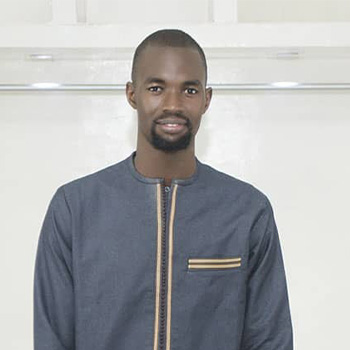Priority Theme Spotlight:
Mame Mor Anta Syll

Author: Ingrid Lee & Ayuko Picot
Theme: Democracy, Conflict, & Polarization
In today’s Priority Theme Spotlight, we feature EGAP’s Visiting Fellow (Spring 2022), Mame Mor Anta Syll. Mame Mor is an Associate Researcher at the University Gaston Berger of Saint-Louis in Senegal. He most recently served as an impact evaluation coordinator in different research initiatives including the project, “Improving Youth Employability through Informal Apprenticeship,” implemented by the Ministry of Employment, Apprenticeship and Vocational Training in Senegal with the World Bank’s support. Mame Mor holds a PhD in Economics from the University Gaston Berger of Saint-Louis and the University of Orleans in France.
We spoke to Mame Mor about his project, “Capacity Building of Gender Elected Officials Under Gender Quotas: Evidence from Senegal.” Mame Mor’s project examines women’s political representation at the local level in northern Senegal after the implementation of a gender parity law in 2010. We asked Mame Mor about the survey experiment looking at the effects of capacity building training sessions for elected local officials across 12 municipalities. In this pilot study, the 12 municipalities were selected based on the need for training, and all female officials, who were part of the study, received an additional skills training module. In a planned future study, the research team plans to randomize selection of treatment and control groups and ensure greater consistency in treatments across genders.
In 2010, the Senegalese government passed a gender quota law. Since then, women’s representation has more than doubled in local assemblies. What was the motivation behind this project, and how does it fit into your broader research agenda?
The Senegalese government passed the law with the intention to ensure equal access to representation as well as full participation in decision-making for women in assemblies, whether they are national or local. Our project was motivated by the fact that the literature gender quota reforms is ambiguous. There is some evidence of positive effects showing that gender quotas have been successful in pushing through favorable reforms for women. However, null or negative effects have also been observed, especially in authoritarian and patriarchal contexts.
Along with gender quotas, other types of policies aimed at improving the way decision-making bodies operate have been implemented by several countries. One of these initiatives is capacity building for politicians, before or after elections. However, there is not much evidence on such initiatives on women’s participation in decision-making bodies in conjunction with gender quotas.
This project looks at the impact of capacity building training within the context of gender quotas. What were your hypotheses on the effects of mixed gender training workshops versus all-female and all-male training workshops?
We tested two hypotheses:
- Capacity building significantly improves the self-assessed level of competence of elected local officials, regardless of gender.
- Gender-separated training provides better results than gender-clustered training.
How does your pilot study contribute to the existing literature on women’s political representation and gender quotas both in Sub-Saharan Africa and, if applicable, around the world?
In recent decades, gender quota policies have been implemented in many countries (Krook & Norris, 2014). A goal of the implementation of quotas is to promote policy adoption of pro-women interests. However, the results have been mixed (see the review by Clayton, 2021). In India, this has allowed the introduction of pro-women reforms such as improved access to water or the installation of informal schools in villages (Chattopadhyay & Duflo, 2004). However, in the Arab world (Shalaby, 2016), East Africa (Berry, Bouka, & Kamuru, 2021), Afghanistan, and Pakistan (Fleschenberg & Bari, 2015), zero or even negative effects have been observed.
In contexts where gender quotas already exist, capacity building activities are used as a complementary tool to foster women’s participation in local bodies. Our analysis aims to contribute to the literature on quota reforms by measuring the effect of capacity building on elected officials’ self-assessed level of competence. Our results showed that women increase their level of self-assessed levels of competence when they attend a women-only training (i.e. without the presence of men). When women receive training in mixed gender groups, this did not raise their self-assessed levels of competence. Men did not increase their self-assessed level of competence in any of the cases considered (in mixed gender or gender separate training).
What are the next steps for this project?
We hope to extend the research to 554 municipalities of Senegal over a longer period of observation (5 years). Senegal held municipal elections in January 2022. Parliamentary elections for the national assembly will be held in July 2022. This presents an opportunity to test the impact of capacity building with an objective assessment (rather than a self-assessment) of elected officials to advocate for pro-women reforms. Also, by increasing the number of municipalities in our sample, we can randomize the participation in training sessions at the municipal level. Finally, we aim to compare capacity building interventions by collaborating with UC Berkeley researchers who are working on similar projects in other countries, such as India.
Watch Mame Mor’s presentation on this project (presented at the University of California, Berkeley’s Center for African Studies Africa Matters seminar on March 3, 2022) below.